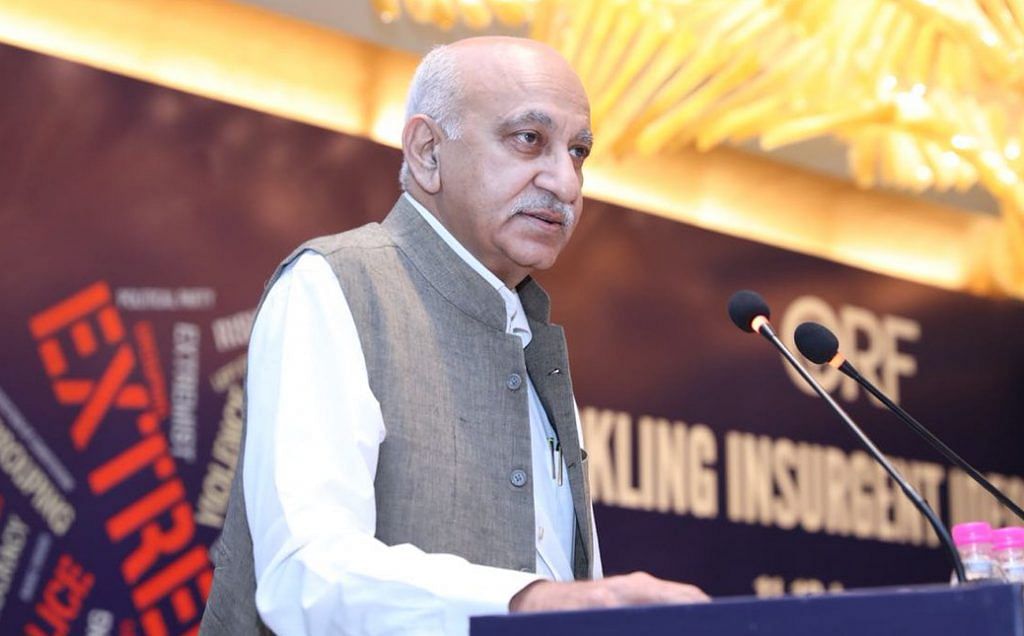The minister of state for external affairs, who was once former PM Rajiv Gandhi’s official spokesperson, calls Indira Gandhi an ‘imperial queen’.
New Delhi: Once a Congress loyalist, union minister M.J. Akbar is the latest among BJP leaders to join the chorus against the Emergency, which he has called “free India’s Jalianwalabagh”.
Akbar, who was actively associated with the Congress party from 1989 to 1992, also served as the official spokesperson of former Prime Minister Rajiv Gandhi. He is the current minister of state for external affairs.
Terming former Prime Minister Indira Gandhi as an “imperial queen”, Akbar — a former editor — said she was responsible for one of the country’s darkest moments during the Emergency, which he alleged, was done to keep her in power.
Akbar had also criticised the Emergency in the now-defunct Sunday magazine, which he edited between late 1970s and early ’80s.
Modi baiter to Modi lover
Known for changing his stance, Akbar was extremely critical of Narendra Modi and the RSS, the BJP’s ideological parent, prior to joining the party in 2014.
In 2002, Akbar had called Modi a “Hitler” and a “megalomaniac”.
In an article he wrote after the 2002 Gujarat riots in Asian Age, he said: “Modi is an ideologue, with a difference. The difference is hysteria. It is an edgy hysteria, which can mesmerise; and it easily melts into the kind of megalomania that makes a politician believe that he is serving the larger good through a destructive frenzy against a perceived enemy.”
“In Hitler’s case, the enemy was the Jew; in Modi’s case the enemy is the Muslim,” wrote Akbar.
Given this background, his entry into BJP was marred by controversy, and he had to apologise for his comments before being allowed to join the party.
“This whole hullaballoo is over the article that I wrote in 2002 during the riots. Please try to understand that I was angry at that time. I was acerbic over the riots, everyone was,” he reportedly told the press.
How he slammed RSS
In his book, Riot after Riot, Akbar writes, “The RSS is not so much an organisation (cultural or political, take your pick as a state of mind). It is the physical form given to an attitude towards the minorities, particularly, the Muslims. It represents Hindu revivalism of the worst sort; in its heart it is still taking revenge against Aurangzeb…”
Referring to the Babri Masjid demolition, he writes in the book, “Lal Krishna Advani has touched a Hitler nerve in India, and the reaction is electric. Myths have become facts, and yesterday’s secret society is turning into today’s mass meeting. Revenge nursed in the privacy of the mind is now public doctrine….The soldiers of the armies of tomorrow’s Hindu Rashtra are in high fever….”
“The parallel with the Germany of the 1920s and 1930s is simply too obvious. At the root is poverty and underdevelopment…Hitler had the Jews. Advani has the Muslims,” he goes on to say.
From friend to foe
He is now criticising the Congress for comparing Modi to Aurangzeb, saying that the party leaders need history lessons.
“There is a serious history deficiency in the IQ of Congress leaders. Why don’t we collect funds and send them some good books,” he said at a press conference Tuesday.
An eminent editor and author of several books, including a biography of Jawaharlal Nehru, Akbar debuted in politics in the 1980s. He came close to Rajiv Gandhi and wielded considerable influence.
He contested Lok Sabha election in 1989 from Kishanganj in Bihar and won but Congress lost badly. He drifted apart from the party after Gandhi’s death in 1991 and he soon returned to full-time journalism.
Though he was critical of Modi, the then CM of Gujarat, he gradually came closer to the BJP as he accused the Gandhi family of indulging in dynasty politics.
